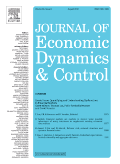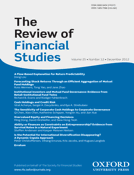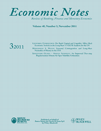
International Journal of Central Banking
Scope & Guideline
Navigating the Future of Economic Policy
Introduction
Aims and Scopes
- Central Banking Frameworks:
Research on the structure and functions of central banks, including their roles in monetary policy implementation, regulation, and financial stability. - Monetary Policy Analysis:
Exploration of the effects of various monetary policies, including conventional and unconventional tools, on the economy, prices, and financial markets. - Financial Stability and Risks:
Examination of systemic risks, financial crises, and the mechanisms through which central banks can mitigate such vulnerabilities. - Empirical and Theoretical Modeling:
Development and application of quantitative models to analyze monetary policy outcomes, financial stability, and economic forecasts. - Interplay between Macroeconomics and Banking:
Investigations into how macroeconomic factors influence banking operations and vice versa, particularly in the context of credit supply and demand. - Regulatory Frameworks and Macroprudential Policies:
Assessment of regulatory measures and their effectiveness in promoting financial stability and addressing systemic risks.
Trending and Emerging
- Digital Currencies and Payments:
A surge in research on central bank digital currencies (CBDCs) and the implications of digital payment systems, reflecting the growing importance of technology in finance. - Impact of COVID-19 on Monetary Policy:
An increasing focus on the effects of the COVID-19 pandemic on monetary policy frameworks, economic recovery, and financial stability, highlighting the need for adaptive strategies. - Macroprudential Policy Integration:
Growing interest in how macroprudential policies can be integrated with monetary policy to enhance financial stability and mitigate systemic risks. - Behavioral Economics in Monetary Policy:
Emerging studies that utilize behavioral economics to understand consumer and market responses to monetary policy, especially in the context of expectations and uncertainty. - Sustainability and Green Finance:
A notable trend towards researching the role of central banks in promoting sustainability and addressing climate change through monetary policy and asset purchase programs.
Declining or Waning
- Traditional Monetary Policy Tools:
There is a noticeable decrease in research focusing solely on traditional monetary policy instruments, as the journal increasingly emphasizes unconventional approaches and the impacts of new tools. - Fixed Exchange Rate Regimes:
Research regarding fixed exchange rate systems and their implications for monetary policy has diminished, reflecting a broader trend towards floating exchange rates and market-driven mechanisms. - Inflation Targeting:
While inflation targeting remains relevant, studies specifically focused on its traditional frameworks seem to be decreasing, likely due to evolving approaches to monetary policy in response to contemporary economic challenges. - Historical Analyses of Monetary Policy:
The journal has seen fewer papers focusing on historical perspectives of monetary policy, as current economic conditions drive a preference for contemporary analyses and forward-looking frameworks. - Microeconomic Foundations of Monetary Theory:
Research exploring the microeconomic underpinnings of monetary policy has become less frequent, indicating a shift towards macroeconomic and systemic perspectives.
Similar Journals

JOURNAL OF ECONOMIC DYNAMICS & CONTROL
Driving Progress in Economic Dynamics through Rigorous ScholarshipJOURNAL OF ECONOMIC DYNAMICS & CONTROL, published by Elsevier, is a distinguished scholarly journal that has established itself as a leading outlet in the fields of applied mathematics, control and optimization, and economics and econometrics since its inception in 1979. With its notable Q1 categorization in 2023 across these disciplines, this journal provides a platform for innovative research that propels theory and practice in dynamic systems and control processes. Researchers, professionals, and students can engage with cutting-edge studies that explore complex economic models and their real-world applications. Although the journal does not offer open access, it remains a vital resource for those aiming to stay informed of the latest advancements in economic dynamics and control methodologies. The journal’s commitment to high-quality research and its impressive standing—ranked in the top percentiles within Scopus categories—underscore its importance and influence within the academic community.

Journal of Banking and Finance Law and Practice
Advancing Knowledge at the Intersection of Banking and LawJournal of Banking and Finance Law and Practice is a premier academic journal published by LAWBOOK CO LTD, focusing on the dynamic intersection of banking, finance, law, and regulatory practices. With an ISSN of 1034-3040, this journal serves as a vital resource for researchers, legal practitioners, and students seeking to enhance their understanding of the evolving legal frameworks governing financial institutions and practices. While the journal is not open access, it provides a wealth of peer-reviewed articles, case studies, and insightful commentary that contribute significantly to the discourse in financial law. The articles featured in this journal aim to address contemporary issues and challenges within the banking and finance sectors, promoting critical analysis and innovative solutions in the legal sphere. As a result, Journal of Banking and Finance Law and Practice holds an important place in scholarly communication, fostering knowledge exchange while shaping future legal practices in finance.

Journal of Banking Regulation
Illuminating the Intersection of Finance and Policy.Journal of Banking Regulation is a premier academic journal published by Palgrave Macmillan Ltd. based in the United Kingdom, contributing significantly to the fields of Economics and Finance. With an ISSN of 1745-6452 and an E-ISSN of 1750-2071, this journal serves as a vital platform for the dissemination of cutting-edge research that addresses the complexities of banking regulations in a rapidly evolving financial landscape. As a Q3 ranked journal in both Economics and Econometrics and Finance categories, it holds a respectable position among its peers, with Scopus ranks highlighting its impact within the research community (Rank #246/716 and #115/317, respectively). The journal has been converging contemporary studies and analyses since its inception in 2008, and actively invites scholars, professionals, and students to explore its insightful articles. Though primarily subscription-based, readers can benefit from its rigorous content, which aims to inform regulatory practices and foster a deeper understanding of the banking sector's intersection with global economic trends.

REVIEW OF FINANCIAL STUDIES
Shaping the Future of Financial ResearchREVIEW OF FINANCIAL STUDIES, published by Oxford University Press Inc, stands as a premier academic journal in the realms of accounting, economics, and finance. With an impressive Impact Factor that reflects its high citation rates and broad influence, this journal, with an ISSN of 0893-9454 and E-ISSN 1465-7368, is considered a cornerstone for researchers, academics, and professionals seeking to contribute to and stay updated on groundbreaking developments in financial studies. Since its inception in 1996, it has established a robust reputation, consistently ranking in the Q1 category across multiple disciplines, highlighting its elite status in the global academic landscape. The Scopus rankings further reinforce its importance, positioning it at the forefront of business, economics, and finance research. While the journal is not open access, it offers vital insights and comprehensive studies that foster a deeper understanding of contemporary financial issues and methodologies. Located in the United Kingdom, the REVIEW OF FINANCIAL STUDIES is an essential resource for those aiming to advance their knowledge and research in this dynamic field.

International Review of Finance
Elevating financial scholarship to new heights.International Review of Finance is a prestigious academic journal published by Wiley, located in the United Kingdom. With its ISSN 1369-412X and E-ISSN 1468-2443, this journal serves as an essential platform for researchers and practitioners in the fields of Economics and Finance. Ranked in the Q2 quartile for both Economics and Econometrics and Finance as of 2023, it showcases high-quality research that contributes significantly to theoretical and practical advancements. Reflecting its standing, the journal is positioned in the 61st percentile in Economics and Econometrics and the 60th percentile in Finance according to Scopus rankings. The scope of the journal includes a diverse range of topics, encouraging innovative discourse across various financial disciplines. Although it does not offer open access, the International Review of Finance continues to be an important resource for academics, professionals, and students seeking to deepen their understanding of evolving financial theories and practices.

EKONOMICKY CASOPIS
Fostering Innovative Discourse in Economics and EconometricsEKONOMICKY CASOPIS is a distinguished journal published by the Institute of Economics Research SAS and the Institute of Forecasting CSPS SAS, offering a comprehensive platform for the dissemination of innovative research in the field of economics and econometrics. Since its inception in 1978, the journal has been committed to fostering scholarly discourse, showcasing empirical studies, theoretical advancements, and policy analyses that contribute to the understanding of economic phenomena. Although categorized in the Q4 quartile in 2023 and ranking in the lower percentiles within Scopus, EKONOMICKY CASOPIS remains a critical resource for researchers and practitioners seeking to engage with the economic challenges of our time. As the journal continues to evolve through 2024, it invites contributions that align with its objectives of enhancing economic insights and promoting academic discussion in Slovakia and beyond. For researchers looking to publish their work or expand their knowledge, EKONOMICKY CASOPIS serves as a vital resource in the expanding landscape of economic research.

Economic Notes
Fostering Dialogue on Critical Economic IssuesEconomic Notes is a peer-reviewed journal published by WILEY, focusing on the dynamic field of economics and econometrics. With an ISSN of 0391-5026 and an E-ISSN of 1468-0300, this esteemed journal offers a platform for researchers, professionals, and students to explore theoretical advancements, empirical studies, and policy implications within the economic landscape. Established in the United Kingdom, Economic Notes has become a noteworthy publication, currently ranked in the Q3 category in the 2023 Economics and Econometrics quartiles, and situating itself at the forefront of the field with a respectable 60th percentile ranking in Scopus. The journal spans a remarkable convergence of scholarship from 2001 to 2024, fueling academic discourse and providing insights into pressing economic issues. Although it does not provide open access options, it remains a crucial resource for those seeking to enhance their understanding and contribute to economic theory and practice.

JOURNAL OF FINANCIAL ECONOMICS
Uncovering cutting-edge studies in financial economics.Welcome to the JOURNAL OF FINANCIAL ECONOMICS, a premier publication in the realms of finance, economics, and accounting, published by Elsevier Science SA in the Netherlands. With its impactful contributions since 1974, this esteemed journal has earned an impressive impact factor and consistently ranks in the Q1 category across various fields, including Accounting, Economics and Econometrics, Finance, and Strategy and Management. Researchers can access cutting-edge studies that delve into both theoretical frameworks and empirical analyses, crucial for advancing financial literacy and economic policies globally. With remarkable Scopus rankings, notably placing #2 in Accounting and #6 in Finance, the journal serves not only as a reliable resource for academics but also as a vital tool for professionals seeking to stay abreast of the latest financial trends and insights. Engage with the latest research and contribute to the dialogue shaping the future of financial economics!

Journal of Central Banking Theory and Practice
Connecting Scholars to the Heart of Monetary TheoryThe Journal of Central Banking Theory and Practice, published by SCIENDO, is a leading open-access journal that has been providing valuable insights into the realms of central banking, monetary policy, and financial stability since its inception in 2012. With its ISSN 1800-9581 and E-ISSN 2336-9205, this journal emphasizes rigorous scholarly research, catering to a wide audience of economists, finance professionals, and academic researchers. Based in Germany, the journal has established a strong reputation, evident from its improved category quartiles - moving from Q3 in Economics, Econometrics, and Finance to a commendable Q2 in 2023. With an impressive Scopus rank of #83/288 in General Economics and a 71st percentile ranking, it stands as a pivotal resource for understanding current trends and practices in central banking. Authors are encouraged to submit high-quality, original research that fosters knowledge and advances the field. This journal not only disseminates significant findings but also promotes discussions that are critical for policymakers and stakeholders in the financial sector.

Annual Review of Financial Economics
Illuminating the Interplay of Economic TheoriesAnnual Review of Financial Economics, published by Annual Reviews, stands as a pivotal journal in the fields of Economics and Finance, recognized for its rigorous analysis and comprehensive reviews since its inception in 2010. With an impressive impact factor reflected in its Q1 ranking in both Economics and Econometrics and Finance for 2023, this journal serves as an essential resource for researchers, professionals, and students keen on understanding the dynamic interplay of financial theories and practices. The ISSN 1941-1367 and E-ISSN 1941-1375 signal its commitment to accessibility and dissemination of cutting-edge research within the community. Addressing crucial topics from market behavior to economic modeling, each annual volume synthesizes the latest findings and theoretical advancements, thus contributing significantly to the global discourse within financial economics. With its high Scopus rankings, including a finance rank of #75 out of 317, the journal continues to foster a deep understanding of financial systems and their implications, serving as an invaluable tool for anyone engaged in the broader economic landscape.